Employee Interest and Challenges in Vocational Training in Australia
VerifiedAdded on 2021/01/02
|8
|1971
|231
Report
AI Summary
This report analyzes employee interests and challenges within the Vocational Education Training (VET) sector in Australia. It begins by defining vocational training and its importance in developing technical skills and maintaining a productive economy. The main body identifies two key interests of Australian employees in VET: acquisition of business knowledge and skills, and exploring future employment opportunities. The report also highlights two major challenges employees face: resourcing issues and the complexity of the VET system, including difficulties in accessing relevant information and the high costs involved. The conclusion emphasizes the importance of vocational training in skill development and suggests that training programs should be tailored to meet employee needs and interests to ensure engagement.

Employee Interest
Paraphrase This Document
Need a fresh take? Get an instant paraphrase of this document with our AI Paraphraser
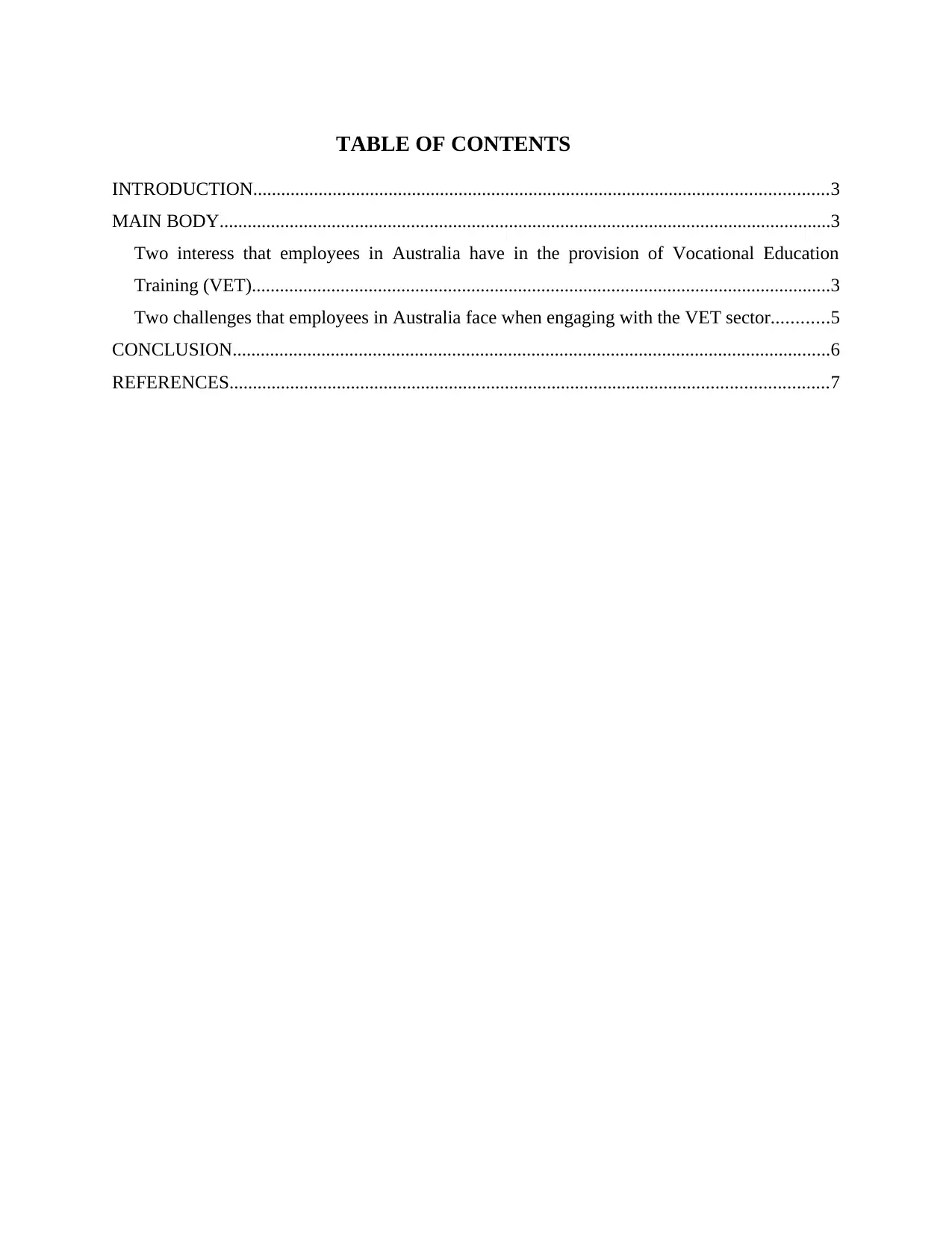
TABLE OF CONTENTS
INTRODUCTION...........................................................................................................................3
MAIN BODY...................................................................................................................................3
Two interess that employees in Australia have in the provision of Vocational Education
Training (VET)............................................................................................................................3
Two challenges that employees in Australia face when engaging with the VET sector............5
CONCLUSION................................................................................................................................6
REFERENCES................................................................................................................................7
INTRODUCTION...........................................................................................................................3
MAIN BODY...................................................................................................................................3
Two interess that employees in Australia have in the provision of Vocational Education
Training (VET)............................................................................................................................3
Two challenges that employees in Australia face when engaging with the VET sector............5
CONCLUSION................................................................................................................................6
REFERENCES................................................................................................................................7
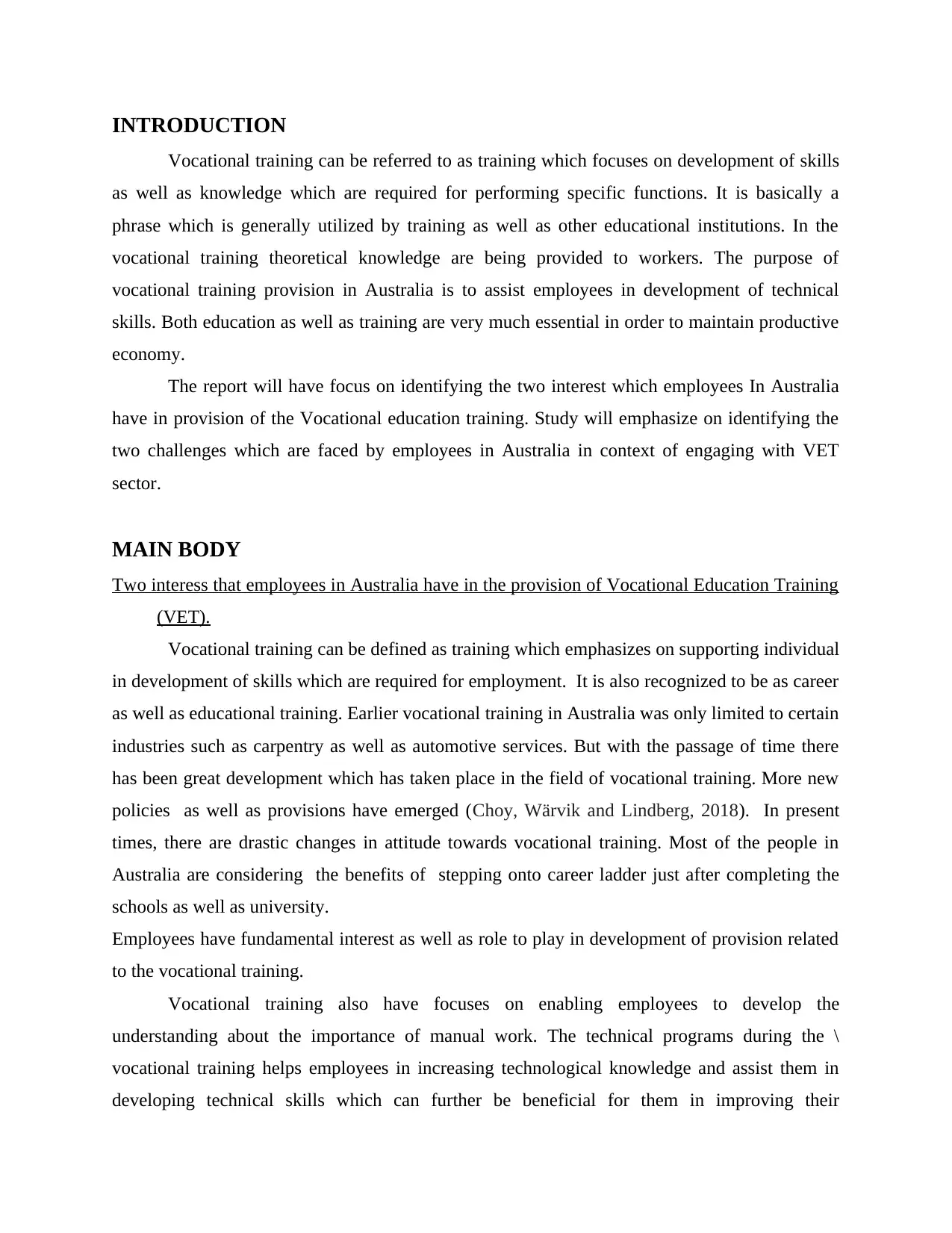
INTRODUCTION
Vocational training can be referred to as training which focuses on development of skills
as well as knowledge which are required for performing specific functions. It is basically a
phrase which is generally utilized by training as well as other educational institutions. In the
vocational training theoretical knowledge are being provided to workers. The purpose of
vocational training provision in Australia is to assist employees in development of technical
skills. Both education as well as training are very much essential in order to maintain productive
economy.
The report will have focus on identifying the two interest which employees In Australia
have in provision of the Vocational education training. Study will emphasize on identifying the
two challenges which are faced by employees in Australia in context of engaging with VET
sector.
MAIN BODY
Two interess that employees in Australia have in the provision of Vocational Education Training
(VET).
Vocational training can be defined as training which emphasizes on supporting individual
in development of skills which are required for employment. It is also recognized to be as career
as well as educational training. Earlier vocational training in Australia was only limited to certain
industries such as carpentry as well as automotive services. But with the passage of time there
has been great development which has taken place in the field of vocational training. More new
policies as well as provisions have emerged (Choy, Wärvik and Lindberg, 2018). In present
times, there are drastic changes in attitude towards vocational training. Most of the people in
Australia are considering the benefits of stepping onto career ladder just after completing the
schools as well as university.
Employees have fundamental interest as well as role to play in development of provision related
to the vocational training.
Vocational training also have focuses on enabling employees to develop the
understanding about the importance of manual work. The technical programs during the \
vocational training helps employees in increasing technological knowledge and assist them in
developing technical skills which can further be beneficial for them in improving their
Vocational training can be referred to as training which focuses on development of skills
as well as knowledge which are required for performing specific functions. It is basically a
phrase which is generally utilized by training as well as other educational institutions. In the
vocational training theoretical knowledge are being provided to workers. The purpose of
vocational training provision in Australia is to assist employees in development of technical
skills. Both education as well as training are very much essential in order to maintain productive
economy.
The report will have focus on identifying the two interest which employees In Australia
have in provision of the Vocational education training. Study will emphasize on identifying the
two challenges which are faced by employees in Australia in context of engaging with VET
sector.
MAIN BODY
Two interess that employees in Australia have in the provision of Vocational Education Training
(VET).
Vocational training can be defined as training which emphasizes on supporting individual
in development of skills which are required for employment. It is also recognized to be as career
as well as educational training. Earlier vocational training in Australia was only limited to certain
industries such as carpentry as well as automotive services. But with the passage of time there
has been great development which has taken place in the field of vocational training. More new
policies as well as provisions have emerged (Choy, Wärvik and Lindberg, 2018). In present
times, there are drastic changes in attitude towards vocational training. Most of the people in
Australia are considering the benefits of stepping onto career ladder just after completing the
schools as well as university.
Employees have fundamental interest as well as role to play in development of provision related
to the vocational training.
Vocational training also have focuses on enabling employees to develop the
understanding about the importance of manual work. The technical programs during the \
vocational training helps employees in increasing technological knowledge and assist them in
developing technical skills which can further be beneficial for them in improving their
⊘ This is a preview!⊘
Do you want full access?
Subscribe today to unlock all pages.

Trusted by 1+ million students worldwide
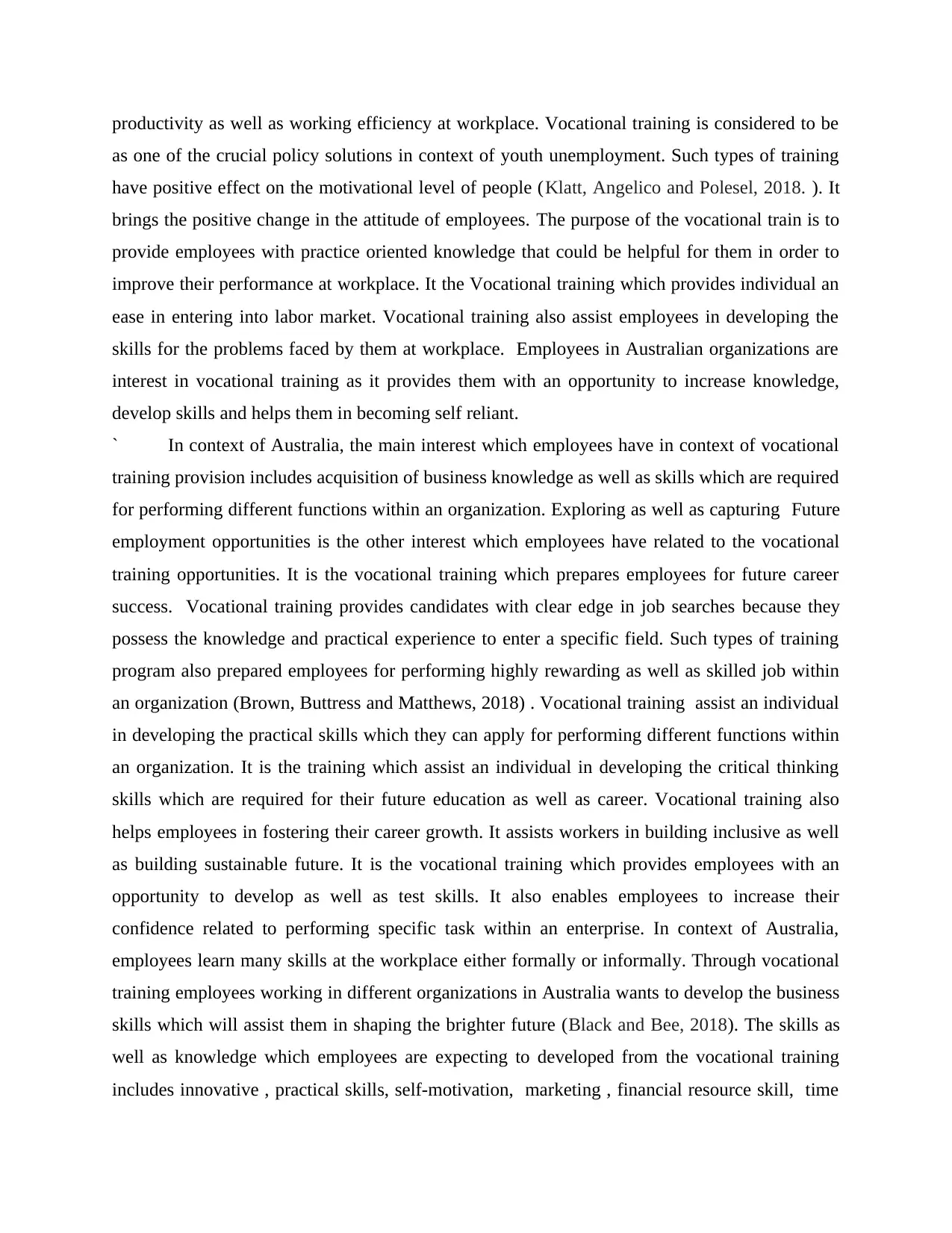
productivity as well as working efficiency at workplace. Vocational training is considered to be
as one of the crucial policy solutions in context of youth unemployment. Such types of training
have positive effect on the motivational level of people (Klatt, Angelico and Polesel, 2018. ). It
brings the positive change in the attitude of employees. The purpose of the vocational train is to
provide employees with practice oriented knowledge that could be helpful for them in order to
improve their performance at workplace. It the Vocational training which provides individual an
ease in entering into labor market. Vocational training also assist employees in developing the
skills for the problems faced by them at workplace. Employees in Australian organizations are
interest in vocational training as it provides them with an opportunity to increase knowledge,
develop skills and helps them in becoming self reliant.
` In context of Australia, the main interest which employees have in context of vocational
training provision includes acquisition of business knowledge as well as skills which are required
for performing different functions within an organization. Exploring as well as capturing Future
employment opportunities is the other interest which employees have related to the vocational
training opportunities. It is the vocational training which prepares employees for future career
success. Vocational training provides candidates with clear edge in job searches because they
possess the knowledge and practical experience to enter a specific field. Such types of training
program also prepared employees for performing highly rewarding as well as skilled job within
an organization (Brown, Buttress and Matthews, 2018) . Vocational training assist an individual
in developing the practical skills which they can apply for performing different functions within
an organization. It is the training which assist an individual in developing the critical thinking
skills which are required for their future education as well as career. Vocational training also
helps employees in fostering their career growth. It assists workers in building inclusive as well
as building sustainable future. It is the vocational training which provides employees with an
opportunity to develop as well as test skills. It also enables employees to increase their
confidence related to performing specific task within an enterprise. In context of Australia,
employees learn many skills at the workplace either formally or informally. Through vocational
training employees working in different organizations in Australia wants to develop the business
skills which will assist them in shaping the brighter future (Black and Bee, 2018). The skills as
well as knowledge which employees are expecting to developed from the vocational training
includes innovative , practical skills, self-motivation, marketing , financial resource skill, time
as one of the crucial policy solutions in context of youth unemployment. Such types of training
have positive effect on the motivational level of people (Klatt, Angelico and Polesel, 2018. ). It
brings the positive change in the attitude of employees. The purpose of the vocational train is to
provide employees with practice oriented knowledge that could be helpful for them in order to
improve their performance at workplace. It the Vocational training which provides individual an
ease in entering into labor market. Vocational training also assist employees in developing the
skills for the problems faced by them at workplace. Employees in Australian organizations are
interest in vocational training as it provides them with an opportunity to increase knowledge,
develop skills and helps them in becoming self reliant.
` In context of Australia, the main interest which employees have in context of vocational
training provision includes acquisition of business knowledge as well as skills which are required
for performing different functions within an organization. Exploring as well as capturing Future
employment opportunities is the other interest which employees have related to the vocational
training opportunities. It is the vocational training which prepares employees for future career
success. Vocational training provides candidates with clear edge in job searches because they
possess the knowledge and practical experience to enter a specific field. Such types of training
program also prepared employees for performing highly rewarding as well as skilled job within
an organization (Brown, Buttress and Matthews, 2018) . Vocational training assist an individual
in developing the practical skills which they can apply for performing different functions within
an organization. It is the training which assist an individual in developing the critical thinking
skills which are required for their future education as well as career. Vocational training also
helps employees in fostering their career growth. It assists workers in building inclusive as well
as building sustainable future. It is the vocational training which provides employees with an
opportunity to develop as well as test skills. It also enables employees to increase their
confidence related to performing specific task within an enterprise. In context of Australia,
employees learn many skills at the workplace either formally or informally. Through vocational
training employees working in different organizations in Australia wants to develop the business
skills which will assist them in shaping the brighter future (Black and Bee, 2018). The skills as
well as knowledge which employees are expecting to developed from the vocational training
includes innovative , practical skills, self-motivation, marketing , financial resource skill, time
Paraphrase This Document
Need a fresh take? Get an instant paraphrase of this document with our AI Paraphraser
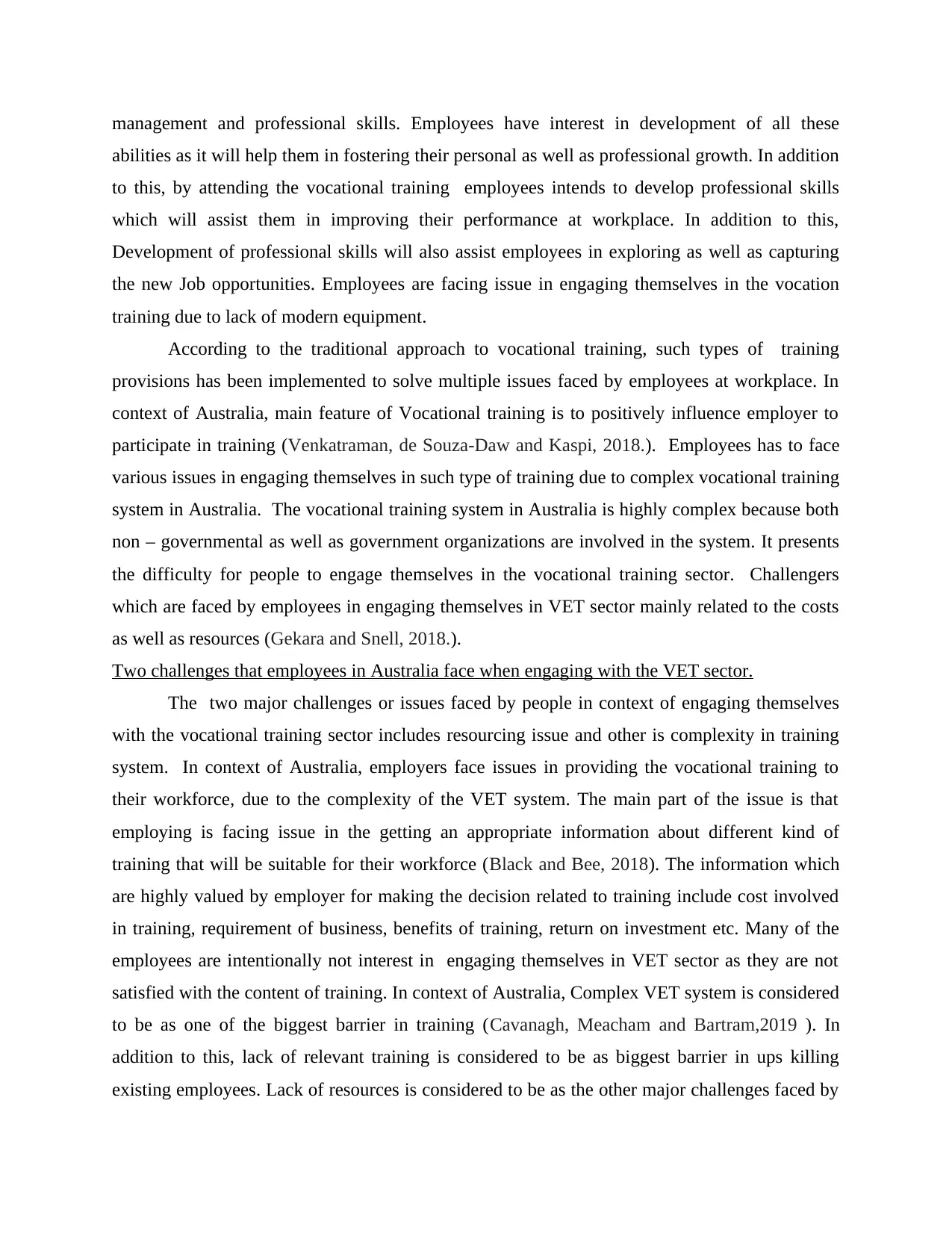
management and professional skills. Employees have interest in development of all these
abilities as it will help them in fostering their personal as well as professional growth. In addition
to this, by attending the vocational training employees intends to develop professional skills
which will assist them in improving their performance at workplace. In addition to this,
Development of professional skills will also assist employees in exploring as well as capturing
the new Job opportunities. Employees are facing issue in engaging themselves in the vocation
training due to lack of modern equipment.
According to the traditional approach to vocational training, such types of training
provisions has been implemented to solve multiple issues faced by employees at workplace. In
context of Australia, main feature of Vocational training is to positively influence employer to
participate in training (Venkatraman, de Souza-Daw and Kaspi, 2018.). Employees has to face
various issues in engaging themselves in such type of training due to complex vocational training
system in Australia. The vocational training system in Australia is highly complex because both
non – governmental as well as government organizations are involved in the system. It presents
the difficulty for people to engage themselves in the vocational training sector. Challengers
which are faced by employees in engaging themselves in VET sector mainly related to the costs
as well as resources (Gekara and Snell, 2018.).
Two challenges that employees in Australia face when engaging with the VET sector.
The two major challenges or issues faced by people in context of engaging themselves
with the vocational training sector includes resourcing issue and other is complexity in training
system. In context of Australia, employers face issues in providing the vocational training to
their workforce, due to the complexity of the VET system. The main part of the issue is that
employing is facing issue in the getting an appropriate information about different kind of
training that will be suitable for their workforce (Black and Bee, 2018). The information which
are highly valued by employer for making the decision related to training include cost involved
in training, requirement of business, benefits of training, return on investment etc. Many of the
employees are intentionally not interest in engaging themselves in VET sector as they are not
satisfied with the content of training. In context of Australia, Complex VET system is considered
to be as one of the biggest barrier in training (Cavanagh, Meacham and Bartram,2019 ). In
addition to this, lack of relevant training is considered to be as biggest barrier in ups killing
existing employees. Lack of resources is considered to be as the other major challenges faced by
abilities as it will help them in fostering their personal as well as professional growth. In addition
to this, by attending the vocational training employees intends to develop professional skills
which will assist them in improving their performance at workplace. In addition to this,
Development of professional skills will also assist employees in exploring as well as capturing
the new Job opportunities. Employees are facing issue in engaging themselves in the vocation
training due to lack of modern equipment.
According to the traditional approach to vocational training, such types of training
provisions has been implemented to solve multiple issues faced by employees at workplace. In
context of Australia, main feature of Vocational training is to positively influence employer to
participate in training (Venkatraman, de Souza-Daw and Kaspi, 2018.). Employees has to face
various issues in engaging themselves in such type of training due to complex vocational training
system in Australia. The vocational training system in Australia is highly complex because both
non – governmental as well as government organizations are involved in the system. It presents
the difficulty for people to engage themselves in the vocational training sector. Challengers
which are faced by employees in engaging themselves in VET sector mainly related to the costs
as well as resources (Gekara and Snell, 2018.).
Two challenges that employees in Australia face when engaging with the VET sector.
The two major challenges or issues faced by people in context of engaging themselves
with the vocational training sector includes resourcing issue and other is complexity in training
system. In context of Australia, employers face issues in providing the vocational training to
their workforce, due to the complexity of the VET system. The main part of the issue is that
employing is facing issue in the getting an appropriate information about different kind of
training that will be suitable for their workforce (Black and Bee, 2018). The information which
are highly valued by employer for making the decision related to training include cost involved
in training, requirement of business, benefits of training, return on investment etc. Many of the
employees are intentionally not interest in engaging themselves in VET sector as they are not
satisfied with the content of training. In context of Australia, Complex VET system is considered
to be as one of the biggest barrier in training (Cavanagh, Meacham and Bartram,2019 ). In
addition to this, lack of relevant training is considered to be as biggest barrier in ups killing
existing employees. Lack of resources is considered to be as the other major challenges faced by
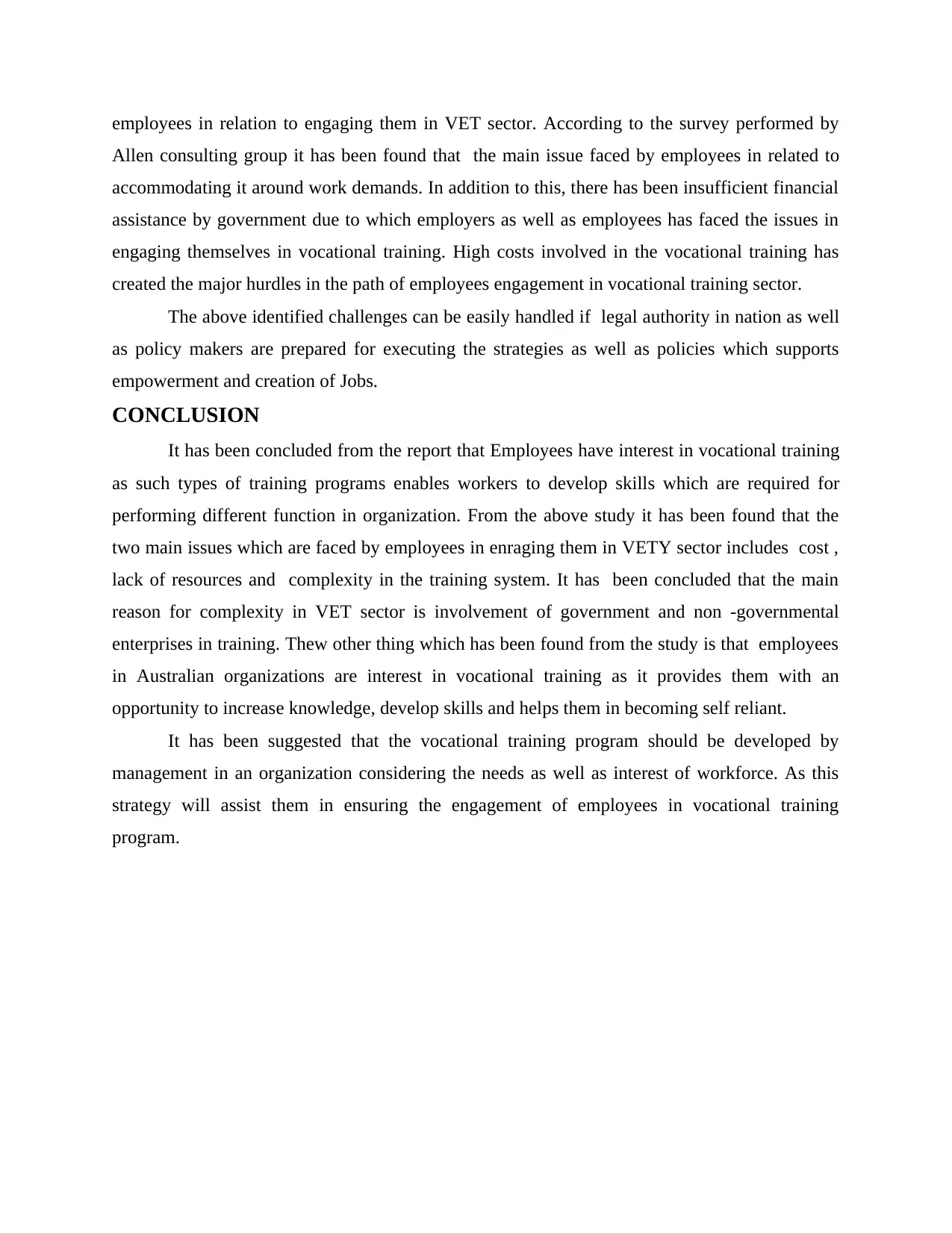
employees in relation to engaging them in VET sector. According to the survey performed by
Allen consulting group it has been found that the main issue faced by employees in related to
accommodating it around work demands. In addition to this, there has been insufficient financial
assistance by government due to which employers as well as employees has faced the issues in
engaging themselves in vocational training. High costs involved in the vocational training has
created the major hurdles in the path of employees engagement in vocational training sector.
The above identified challenges can be easily handled if legal authority in nation as well
as policy makers are prepared for executing the strategies as well as policies which supports
empowerment and creation of Jobs.
CONCLUSION
It has been concluded from the report that Employees have interest in vocational training
as such types of training programs enables workers to develop skills which are required for
performing different function in organization. From the above study it has been found that the
two main issues which are faced by employees in enraging them in VETY sector includes cost ,
lack of resources and complexity in the training system. It has been concluded that the main
reason for complexity in VET sector is involvement of government and non -governmental
enterprises in training. Thew other thing which has been found from the study is that employees
in Australian organizations are interest in vocational training as it provides them with an
opportunity to increase knowledge, develop skills and helps them in becoming self reliant.
It has been suggested that the vocational training program should be developed by
management in an organization considering the needs as well as interest of workforce. As this
strategy will assist them in ensuring the engagement of employees in vocational training
program.
Allen consulting group it has been found that the main issue faced by employees in related to
accommodating it around work demands. In addition to this, there has been insufficient financial
assistance by government due to which employers as well as employees has faced the issues in
engaging themselves in vocational training. High costs involved in the vocational training has
created the major hurdles in the path of employees engagement in vocational training sector.
The above identified challenges can be easily handled if legal authority in nation as well
as policy makers are prepared for executing the strategies as well as policies which supports
empowerment and creation of Jobs.
CONCLUSION
It has been concluded from the report that Employees have interest in vocational training
as such types of training programs enables workers to develop skills which are required for
performing different function in organization. From the above study it has been found that the
two main issues which are faced by employees in enraging them in VETY sector includes cost ,
lack of resources and complexity in the training system. It has been concluded that the main
reason for complexity in VET sector is involvement of government and non -governmental
enterprises in training. Thew other thing which has been found from the study is that employees
in Australian organizations are interest in vocational training as it provides them with an
opportunity to increase knowledge, develop skills and helps them in becoming self reliant.
It has been suggested that the vocational training program should be developed by
management in an organization considering the needs as well as interest of workforce. As this
strategy will assist them in ensuring the engagement of employees in vocational training
program.
⊘ This is a preview!⊘
Do you want full access?
Subscribe today to unlock all pages.

Trusted by 1+ million students worldwide
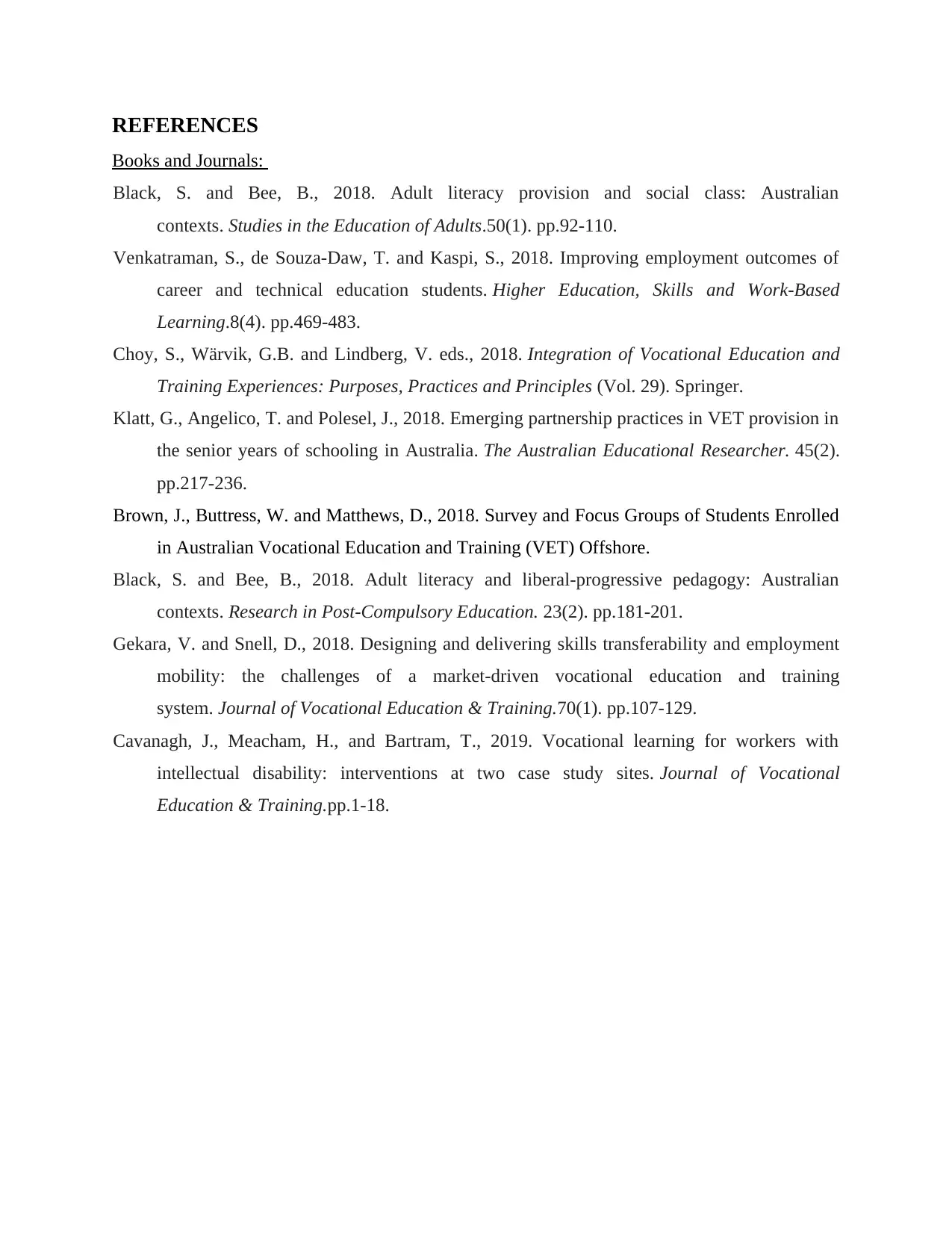
REFERENCES
Books and Journals:
Black, S. and Bee, B., 2018. Adult literacy provision and social class: Australian
contexts. Studies in the Education of Adults.50(1). pp.92-110.
Venkatraman, S., de Souza-Daw, T. and Kaspi, S., 2018. Improving employment outcomes of
career and technical education students. Higher Education, Skills and Work-Based
Learning.8(4). pp.469-483.
Choy, S., Wärvik, G.B. and Lindberg, V. eds., 2018. Integration of Vocational Education and
Training Experiences: Purposes, Practices and Principles (Vol. 29). Springer.
Klatt, G., Angelico, T. and Polesel, J., 2018. Emerging partnership practices in VET provision in
the senior years of schooling in Australia. The Australian Educational Researcher. 45(2).
pp.217-236.
Brown, J., Buttress, W. and Matthews, D., 2018. Survey and Focus Groups of Students Enrolled
in Australian Vocational Education and Training (VET) Offshore.
Black, S. and Bee, B., 2018. Adult literacy and liberal-progressive pedagogy: Australian
contexts. Research in Post-Compulsory Education. 23(2). pp.181-201.
Gekara, V. and Snell, D., 2018. Designing and delivering skills transferability and employment
mobility: the challenges of a market-driven vocational education and training
system. Journal of Vocational Education & Training.70(1). pp.107-129.
Cavanagh, J., Meacham, H., and Bartram, T., 2019. Vocational learning for workers with
intellectual disability: interventions at two case study sites. Journal of Vocational
Education & Training.pp.1-18.
Books and Journals:
Black, S. and Bee, B., 2018. Adult literacy provision and social class: Australian
contexts. Studies in the Education of Adults.50(1). pp.92-110.
Venkatraman, S., de Souza-Daw, T. and Kaspi, S., 2018. Improving employment outcomes of
career and technical education students. Higher Education, Skills and Work-Based
Learning.8(4). pp.469-483.
Choy, S., Wärvik, G.B. and Lindberg, V. eds., 2018. Integration of Vocational Education and
Training Experiences: Purposes, Practices and Principles (Vol. 29). Springer.
Klatt, G., Angelico, T. and Polesel, J., 2018. Emerging partnership practices in VET provision in
the senior years of schooling in Australia. The Australian Educational Researcher. 45(2).
pp.217-236.
Brown, J., Buttress, W. and Matthews, D., 2018. Survey and Focus Groups of Students Enrolled
in Australian Vocational Education and Training (VET) Offshore.
Black, S. and Bee, B., 2018. Adult literacy and liberal-progressive pedagogy: Australian
contexts. Research in Post-Compulsory Education. 23(2). pp.181-201.
Gekara, V. and Snell, D., 2018. Designing and delivering skills transferability and employment
mobility: the challenges of a market-driven vocational education and training
system. Journal of Vocational Education & Training.70(1). pp.107-129.
Cavanagh, J., Meacham, H., and Bartram, T., 2019. Vocational learning for workers with
intellectual disability: interventions at two case study sites. Journal of Vocational
Education & Training.pp.1-18.
Paraphrase This Document
Need a fresh take? Get an instant paraphrase of this document with our AI Paraphraser

1 out of 8
Related Documents
Your All-in-One AI-Powered Toolkit for Academic Success.
+13062052269
info@desklib.com
Available 24*7 on WhatsApp / Email
![[object Object]](/_next/static/media/star-bottom.7253800d.svg)
Unlock your academic potential
Copyright © 2020–2026 A2Z Services. All Rights Reserved. Developed and managed by ZUCOL.




